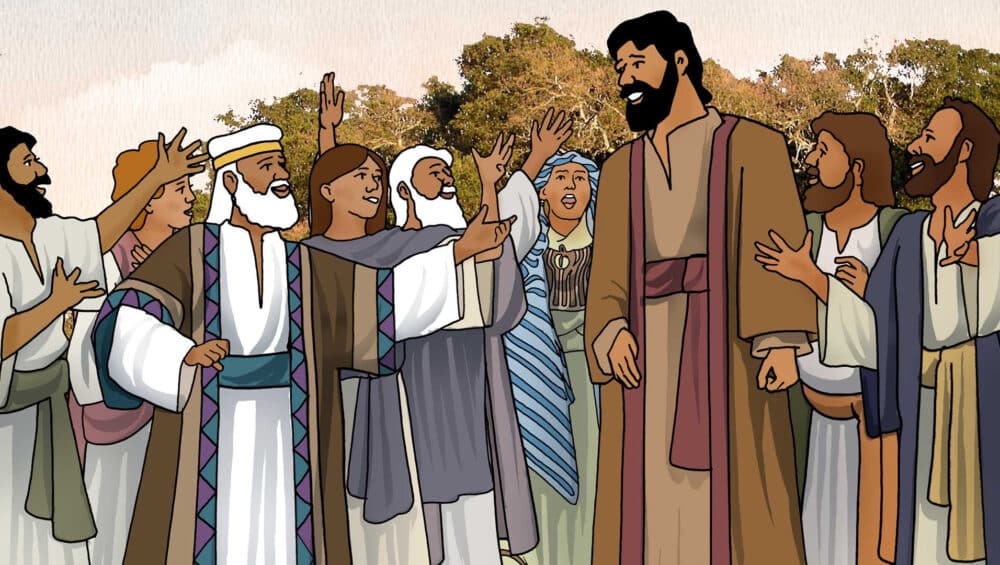John Paul Stanley / YoPlace.com
Welcome to Livin’ Light’s Bible-In-A-Year challenge of discovering God’s love for us and His purpose for our lives. Here is the format for this great adventure: The daily reading assignment is posted at 5 a.m. After each day’s reading, Leigh An Coplin, the blog host, shares observations and poses questions about difficult passages to Rob Fields, who studied Christian Education at Asbury Seminary and currently teaches Biology in the Orlando area. To start from the beginning, click on 365 Bible Readings and scroll down to Day 1. The reading schedule is taken from The One Year Chronological Bible NLT.
Today’s Reading
— 1 Samuel 9-12:25
(1043 BC) Click here for a timeline of the entire Bible.
Questions & Observations
Q. (1 Samuel 9:21): Again, we have God choosing someone least expected, although he is the tallest in the land, so maybe that helps him get noticed?
A. It appears that the people wanted Saul as king because he was such a man of stature, but we can’t say exactly why God made Saul His king. Saul passed the “eye test” in a way that David never will (as we will see shortly), but Saul (as we see in 10:22) is actually a fearful man who is not ready to rule the people, even though he will have his moments. The writer clearly desires us to see the contrast between David and Saul, especially as the become rivals in a few chapters.
O. (9:22-24): So, Samuel had expected Saul all along because God had told him to expect someone to come (1 Samuel 9:15-16).
Q. (10:1): God has obviously told Samuel how to anoint someone. Why the olive oil? We may have talked about this before? And, wouldn’t he go around with a oily head? I know that’s not important, just a visual that turns on my curiosity. About the prophets, were they in direct communication with God, or did they just hear what we read in the Bible? I would think that there are a lot of God’s messages that we don’t know about? So, in 10:10, we read that the Spirit enters Saul and allows him to prophesy?
A. Olive oil (in addition to serving various cooking purposes as it does today) was used for a variety of health reasons — it is actually still used today as a hair treatment in the Middle East. One of the things that the oil was used for was to protect animals (sheep in particular) from insects that would get into their ears: the oil was poured on their head to make the wool slick. So that oil represented protection and also selection (a shepherd would use the oil to protect his sheep), which is where the symbolism comes from. Oil represents selection or choosing when used in this way, and the most common oil was olive oil.
We obviously have no way of knowing about prophecy that is not included in Scripture, but in this case, Samuel is using his prophetic vision to convince Saul that he has truly received an accurate vision of God of God’s plans for Saul. The Spirit came UPON Saul, not within him (it is a similar idea to the anointing of oil). The Spirit does not enter into people until Pentecost in the NT, after the atonement of Jesus.
Q. (10:9): What is meant here by God giving Saul a new heart?
A. God empowered Saul to be the king over all Israel.
Q. (10:27): Why would a king gouge out a right eye? He is obviously a dictator. I also don’t understand how anyone could gather that many men and perform this heinous act. Same with when they gathered thousands of men to be circumcised, how was it possible? Just watch the news and we see that massive imprisonments go on today by way of military. I just wondered how they had such enforcement back then. Military also?
A. The eye gouging would serve two purposes: first, anyone who saw the person would immediately know that they had been disfigured, which would have been a humiliation. Secondly, there is a military significance as we discussed with the removal of big toes and thumbs: the Israelite army (like all armies of the day) would have used various forms of archery to win battles, and removing an archer’s eye would have rendered them almost useless in battle.
I don’t have a good answer on the logistics of these attacks, but I can tell you that if you have hundreds or thousands of men yourself, you can fairly quickly accomplish some pretty messy work.
Q. (11:7): Obviously, cutting something was a way to express anger in those days as we saw a few days ago with the concubine. This act elicits a putrid image. I’m sure Saul got everyone’s attention. Who would be put to the task of delivering such a message to the tribes?
A. Likely servants of the tribe of Benjamin, Saul’s house. It is possible that it was even Saul’s family servants.
Q. (12:12-17): Why did God provide a king if He is the king. Why did he give in to the Israelites wishes?
A. Because they asked Him to. In His mercy (9:16), He has given them the desires of their hearts, as any good Father will try to do … within reason. The king will come to be a symbol of the entire kingdom, so it will be able to see the fortunes of the nation in one man. This is how the narrative will proceed until the destruction of Jerusalem almost 500 years later.
For further study: What does mercy look like? https://www.compassion.com/poverty/mercy-definition.htm
Shop: Christian shirts get noticed. Check out these conversation starters: https://livinlight.org/shop/
Tomorrow’s reading
— 1 Chronicles 9:34-39
— 1 Samuel 13:1-5, 19-23, 6-18
— 1 Samuel 14:1-52











